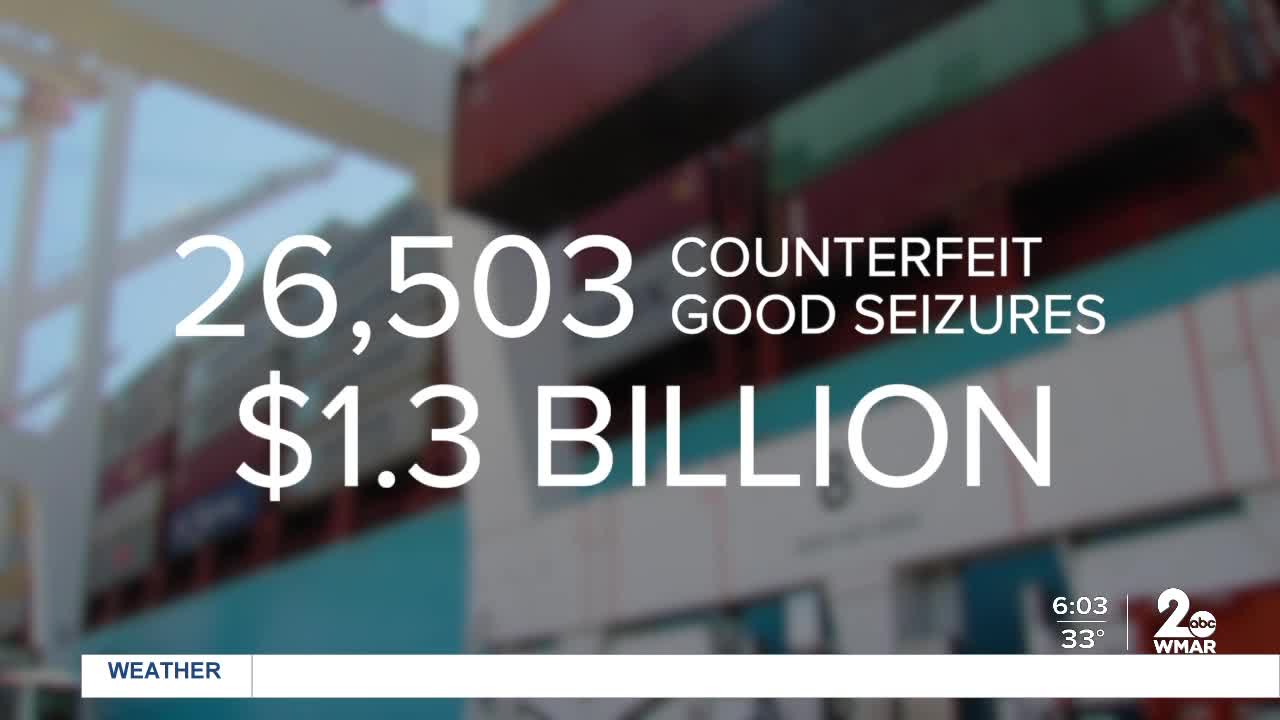BALTIMORE — Gifts that seem like a steal could be counterfeit. U.S Customs and Border Protection frequently seizes knock-offs, including $30 million worth of fake designer products in the last month.
Officers review the manifests and invoices for various shipments. If anything is off, that shipment is sent to a centralized exam station.
“Here we have a bunch of different commodities that come from all across the world,” said Shane Smith, Customs and Border Protection officer at the Port of Baltimore.
Boxes stretch the entire length of the building and contain toys, car parts, and, sometimes, counterfeit goods.
CBP seized 26,503 shipments of counterfeit goods valued at over $1.3 billion during 2020, or an average of $3.6 million in counterfeit goods seized every day.
“Even though this packaging looks amazing, we still don’t know the ingredients inside,” Smith said about a counterfeit Kylie Lip Kit. “If they’re being produced somewhere where the supply chain isn’t as secure and the ingredients are subpar unknown, it poses a health and safety issue for the average consumer putting it on their lip.”
Manufacturers provide product guides and contacts to help CBP officers identify the knock offs.
“There’s supposed to be three points of contact -- the ‘d,’ the ‘i,’ and the ‘d,’” said Smith about a counterfeit Adidas jersey. “So yes, they hit that, so you’re like, okay, this is probably legit on first look. But then when you go deeper into the product guide, you notice on the interior part of this shirt, this is where the red flag lies. There’s no writing on this label.”
Counterfeiters are crafty. They’ll learn these tells then try to get around them. For example, officers discovered a shipment of counterfeit AirPods. The logo on the box was raised, an Apple security feature, however, the serial number for every box was the same. And even though the headphones were functioning, officers found that the quality was inferior to the real thing.
“These items can retail for up to $2,000-4,000 MSRP value and people sell them for $700 or even $200,” Smith said. “But again, you have to think about the livelihoods of the American people, the employees of these companies and we have to protect our economy and have consumer confidence in what we’re buying.”
Smith added that sending money to counterfeiters could be funding illegal activities, and cutting corners with safety regulations can cause harm to your health, home, or kids.
“If it’s a choking hazard for a kid that’s an issue, then it can be seized or destroyed and not allowed for import,” Smith said.
CBP has teamed up with the U.S. Consumer Product Safety Commission to identify hazardous toys and test for different metals and chemicals.
A shipment of swing seats was recently flagged for unusually high lead content.
“So kids could potentially be touching this, swinging on the swing and then touching their binkies or mouths and they could be ingesting harmful substances,” Smith said. “We’re talking hundreds and hundreds of swings that could be on different playgrounds in every suburb of the state of Maryland.”
The top counterfeit products seized by CBP are handbags and wallets, clothes, footwear, watches and jewelry, and electronics.
CBP is also warning consumers about counterfeit pharmaceuticals and have a seen a rise in counterfeit COVID tests, face masks, and COVID treatments.
Click here to report any suspected counterfeiters to CBP. And avoid purchasing counterfeit goods by buying directly from the trademark holder or from authorized retailers.
When shopping online, read seller reviews and check for a working U.S. phone number and address that can be used to contact the seller.
Review CBP’s E-Commerce Counterfeit Awareness Guide for Consumers. And if the price of a product seems too good to be true, it probably is.



